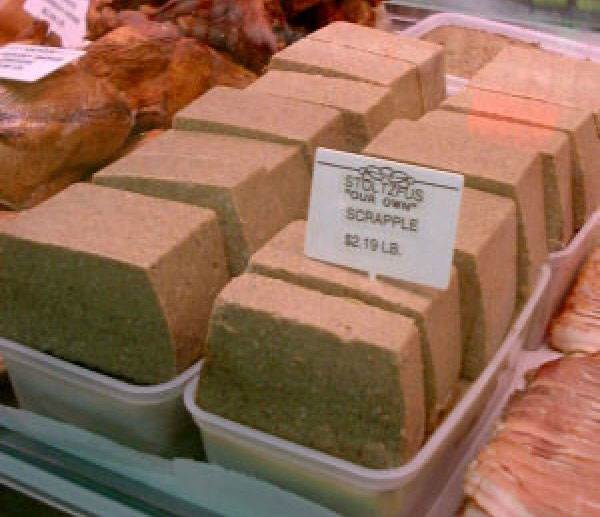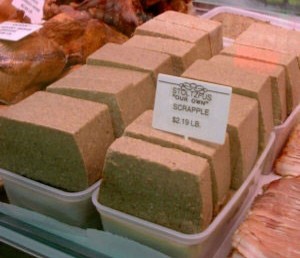Pork Mush—The Pennsylvania Treat
Unless you live in the Middle Atlantic states, you may have never had the dubious pleasure of breakfasting on scrapple—a fried slice of pork-mush. Often erroneously called Philadelphia Scrapple, it’s really a dish that originated in the Eastern Pennsylvania farmlands of German born settlers—far from the city of Brotherly Love.
It’s dictionary defined as “cornmeal mush made with the meat and broth of pork, seasoned with onions, spices and herbs and shaped into loaves for slicing and frying.” The word, scrapple originates from “scrap” or “scrappy” meaning made up of odds and ends for that’s exactly what it is—boiled, ground leftover pig scraps with cornmeal and spices thrown in. Scrapple lovers think of it as food for the gods. Anti-scrapplers consider it a culinary abomination.
Scrapple is the unique creation of the Pennsylvania Dutch, and therefore only quasi-American as the immigrants combined their German heritage with New World ingredients. The term “Pennsylvania Dutch” is a corrupted form of Pennsylvania Deutsche, mostly transplanted Rhineland farmers who worked hard and ate heartily. They are frugal people and many of their dishes make imaginative use of every part of the butchered hog’s anatomy. Scrapple is one of them.
But what parts of the hog go into the creation of scrapple? After the ham, bacon, chops and other cuts of meat are taken from the butchered pig—what remains are fixings for scrapple—including the meat scraped off the head. Scrapple may contain pork skin, pork heart, pork liver, pork tongue—even pork brains. Those faint of palate needn’t venture any further.
Pig
If one can get past what goes into making scrapple, he or she may discover it tastes surprising good—like country-style pork sausage with a unique shape and texture. It’s a deck of cards sized slab, crispy on the outside, soft inside and may be embellished with butter, maple syrup, applesauce, ketchup or mashed in with its usual partner: a plateful of fried eggs. Besides, modern day recipes make no use of questionable pork parts. (See recipes below.)
Being born and raised in Pennsylvania, I was destined to have a piece of a scrapple slapped across my breakfast plate. Being a good source of cheap protein, it often made a morning appearance at our table. I didn’t quite relish it because of its gray color. That may have been the fault of my mother, the cook. Properly prepared and fried, scrapple should be a tasty looking golden brown.
Although edible raw, Scrapple is usually sliced and fried in butter or lard. Served in a deep, placid pool of egg yolk and ketchup, it is a veritable cholesterol meltdown.


